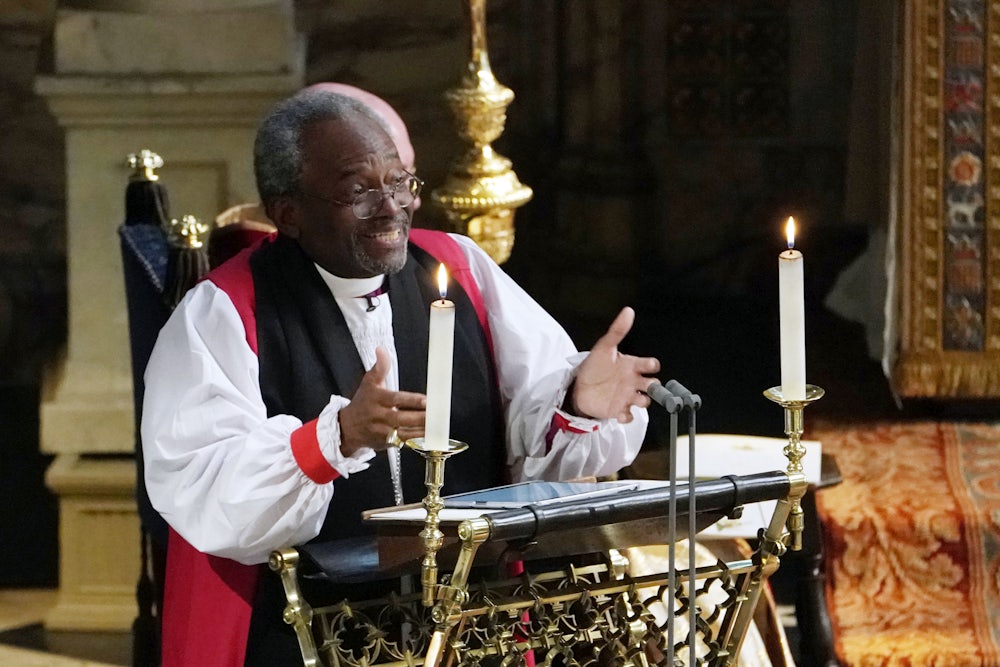Before he even began his sermon at the marriage of the Duke and Duchess of Sussex, the Most Reverend Michael Curry rang a different note. Was that an iPad in his hands? Curry is the presiding bishop of the Episcopal Church, the first African-American to hold the post. In contrast to the pleasant but stiff manner of the Archbishop of Canterbury Justin Welby, who solemnized the marriage, and the Right Reverend David Conner, who led the service, Curry was warm. He seemed more connected to the contemporary world. And Curry was there to talk about reality, a novelty in this most unreal of spectacles.
His sermon began citing the Song of Solomon: “Love is as strong as death ... its flashes are flashes of fire, a raging flame.” From there he worked up a theme of love as fire. Dr. Martin Luther King saw power in love, Curry said: “Don’t underestimate it.” Then he cited “an old medieval poem that says, ‘Where true love is found, god himself is there.’” Presumably he meant the ubi caritas hymn, whose refrain translates as, “Where charity and love are, God is there.”
Love is powerful, love is vast—love is about more than one young couple. But, Curry continued, love is also religious. The core of Jesus’s teachings lie in unconditional love for god. Love your neighbor, too. Those two concepts underpin every other commandment. From here, Curry made a gorgeous rhetorical pivot. Jesus’s movement, he said, was revolutionary. “If you don’t believe me,” he said, “there were some old slaves in America’s antebellum South who explained the dynamic power of love and why it has the power.” Love is not only big and small, but also personal and political. It is social and it is individual, and it works even in history’s darkest hours.
Imagine a world where love drives us to be truly selfless, Curry went on. In one of the many jokes that had the congregation in small rictus grins, Curry said that “Jesus did not get an honorary doctorate for dying. He ... wasn’t getting anything out of it.” Imagine if we all lived this way, Curry exhorted those in attendance, and those watching at home. “Imagine this tired old world when love is the way.”
Watch the breathtaking rendition of "Stand by me" performed at the #RoyalWedding by Karen Gibson and The Kingdom Choir. pic.twitter.com/diZpeoDxbM
— Vox (@voxdotcom) May 19, 2018
Before he got to the second half of his sermon—which departed from the fairly traditional theme of love, its politics, its nature, its role in Christianity—Curry made a sweetly offhand remark: “With this, we’ll sit down. We gotta get y’all married.” It was one of the many moments at which the British congregation looked happy but confused. The Anglican Church in the U.K. takes a fairly solemn tone, especially at state occasions like this, and Curry’s preaching style felt notably American and notably black. It was a very welcome change to the usual English droning, even if some attendees were visibly perplexed.
His observations on fire went in some interesting and strange directions. He began by citing the French Jesuit Pierre Teilhard de Chardin, born 1881, in his words a “Jesuit, Roman Catholic priest, a scientist, a scholar, a mystic.” In his writings, Curry recalled, de Chardin wrote “from his scientific background as well as his theological one” that the greatest technological breakthrough of human history was the harnessing of fire. It could be used to cook food, prevent disease, heat homes: “There was no Bronze Age without fire, no Iron Age without fire, no Industrial Revolution without fire.”
Curry went on to observe that the internal combustion engines of cars and planes run on fire. Contemporary manufacturing runs on fire. “Fire makes it possible for us to text and tweet and e-mail and Instagram and Facebook, and otherwise socially be dysfunctional with each other.” This was perhaps the oddest moment in Curry’s address, because his shift to a critique of modern communications made it unclear whether his thoughts on fire were, at this point, literal or allegorical. I felt a little lost.
But then he took his speech back to the beginning. If we ever make a breakthrough on the level of fire again, Curry concluded, then it would change the world a second time. Citing Dr. King once more, Curry ended with the command to “discover love, the redemptive power of love.” In so doing we can fulfill King’s other great prediction: “We will make of this old world a new world.”
What was remarkable about Curry’s address was its rhetorical balance. He isolated two key elements of the Song of Solomon—fire and love—and pulled a political meaning out of both. If humanity can achieve the truest form of love, which is total selflessness, then we will achieve a breakthrough of similarly transformative power to the harnessing of fire. In turn, he used King’s vision of an old world made new as a description of that transformed world.
By referencing slavery and King, Curry made it abundantly clear that the new world of love will be a utopia cleansed of racism’s pollution. He made it sound like an inevitable future, not a conditional hope. Coming as it did right before The Kingdom Choir’s beautiful rendition of “Stand By Me,” Curry’s address made sure that the official entry of blackness—American blackness, specifically—to the British monarchy would be a conscious, examined event. A small detour into Instagram and combustion engines can be forgiven: Curry let no wedding attendee leave without feeling the weight of the occasion.
